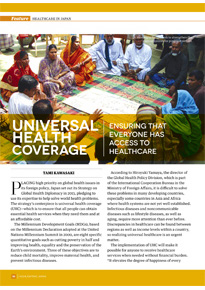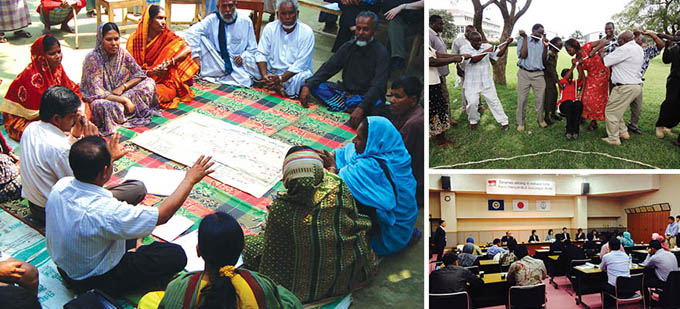Home > Highlighting JAPAN >Highlighting Japan November 2014>Healthcare in Japan
Highlighting JAPAN

Healthcare in Japan
Universal Health Coverage
Ensuring that Everyone Has Access to Healthcare

Placing high priority on global health issues in its foreign policy, Japan set out its Strategy on Global Health Diplomacy in 2013, pledging to use its expertise to help solve world health problems. The strategy’s centerpiece is universal health coverage (UHC)—which is to ensure that all people can obtain essential health services when they need them and at an affordable cost.
The Millennium Development Goals (MDGs), based on the Millennium Declaration adopted at the United Nations Millennium Summit in 2000, are eight specific quantitative goals such as cutting poverty in half and improving health, equality and the preservation of the Earth’s environment. Three of these objectives are to reduce child mortality, improve maternal health, and prevent infectious diseases.
According to Hiroyuki Yamaya, the director of the Global Health Policy Division, which is part of the International Cooperation Bureau in the Ministry of Foreign Affairs, it is difficult to solve these problems in many developing countries, especially some countries in Asia and Africa where health systems are not yet well established. Infectious diseases and noncommunicable diseases such as lifestyle diseases, as well as aging, require more attention than ever before. Discrepancies in healthcare can be found between regions as well as income levels within a country, so realizing universal healthcare is an urgent matter.
The implementation of UHC will make it possible for anyone to receive healthcare services when needed without financial burden. “It elevates the degree of happiness of every single person,” explains Yamaya. “This is Japan’s diplomatic policy—the concept of human security.”
Japan has overcome infectious diseases and achieved universal health coverage through its public health insurance. Having become a society with a long healthy life expectancy, it also has experience in dealing with the challenges of an aging society. With superb medical equipment and pharmaceutical products, Japan is renowned in the field of advanced medical technology as well. Given such a history in healthcare and high level of technical capability, the Japanese government considers healthcare a vital field for its growth strategy, and is striving to help solve world health challenges in partnership with the private sector.
UHC should be promoted according to the medical circumstances and level of development in each country rather than in a one-size-fits-all manner. Devising a health insurance system, for example, can be done in several ways, such as by public financing from taxation or through a health insurance fund supported by contributions.
Japan has been carrying out a “safe motherhood project” in Bangladesh as part of its bilateral assistance that is designed to improve the health of expectant and nursing mothers. The project provides technical assistance on implementing health policies related to mothers, children and newborns, as well as assistance for community mobilization and loans for hospital renovations. In Africa, Japan is helping to develop more human resources such as health administrators in public sectors and to strengthen the regional network. Japan is also implementing technical cooperation projects to enhance Indonesia’s social security system.
On top of that, the recipient country must establish a viable self-reliant system for providing the relevant services, keep the system running, and train its own professional workforce even after the assistance ends. For these, Japan’s knowhow and track record of sustainable development assistance are invaluable in promoting UHC.
With the 2015 deadline to attain those eight MDGs approaching fast, ways are being sought to resolve unfinished agenda items as well as new issues. As Japan strives to mainstream UHC in the post-2015 development agenda, it is working closely with entities and global partners like the World Health Organization, the World Bank and the United Nations Development Programme, and implementing bilateral and multilateral cooperation. “Eventually, we would like to contribute to realizing human security through UHC,” Yamaya concludes.
© 2009 Cabinet Office, Government of Japan






